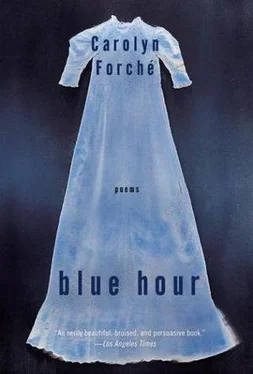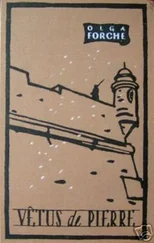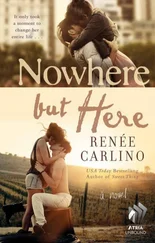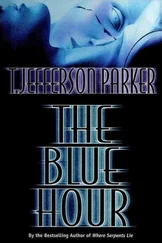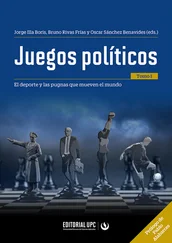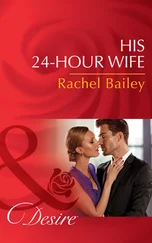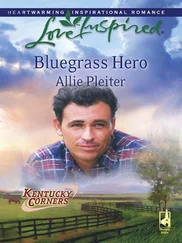for Harry and Sean Christophe
These moments are immortal, and most transitory of all; no content may be secured from them…. Beams of their power stream into the ordered world and dissolve it again and again.
— Martin Buber
Horses were turned loose in the child’s sorrow. Black and roan, cantering through snow.
The way light fills the hand with light, November with graves, infancy with white.
White. Given lilacs, lilacs disappear. Then low voices rising in walls.
The way they withdrew from the child’s body and spoke as if it were not there.
What ghost comes to the bedside whispering You?
— With its no one without its I —
A dwarf ghost? A closet of empty clothes?
Ours was a ghost who stole household goods. Nothing anyone would miss.
Supper plates. Apples. Barbed wire behind the house.
At the end of the hall, it sleepwalks into a mirror wearing mother’s robe.
A bedsheet lifts from the bed and hovers. Face with no face. Come here.
The bookcase knows, and also the darkness of books. Long passages into ,
Endless histories toward, sleeping pages about. Why else toss gloves into a grave?
A language that once sent ravens through firs. The open world from which it came.
Words holding the scent of an asylum fifty years. It is fifty years, then.
The child hears from within: Come here and know, below
And unbeknownst to us, what these fields had been.
The moon slips from its cerement, and my son, already disappearing into a man, moves toward his bed for the night, wrapped in a towel of lake scent.
A viola, night-voiced, calls into its past but nothing comes.
A woman alone rows across the lake. Her life is intact, but what she thought could never be taken has been taken. An iron bridge railing one moment its shadow the next.
It is n’y voir que du bleu, it is blind to something. Nevertheless.
Even the most broken life can be restored to its moments.

My son rows toward me against the wind. For thirty-six years, he rows. In 1986, he is born in Paris.
Bice the clouds, watchet, indigo, woad.
We lived overlooking the cemetery. It was the summer of the Paris bombings. I walked him among the graves for what seemed hours but were clouds drifting across marble.

Believing it possible to have back the field in its flowering, my friend has brought me here, has given me an open window, the preludes, an echo of my son’s laughter on the rumpled lake.
Go wherever you can but keep returning to the present.
The human soul weighs twenty-six grams. A cathedral can become a dovecote.

I was born in America just after the war. My legs grew deformed, and so they had to be fitted with a special brace.
At night I banged the brace against the wooden crib bars and cried (so they say). The cries had to be stopped before I woke “the entire house.”

In the morning, footsteps, a wind caught between roofs. From the quarry of souls they come into being: supernal lights, concealed light, light which has no end.
Everything in the world has a spirit released by its sound.
The room turns white again, and white. For years I have opened my eyes and not known where I was.
It was like a kettle wrapped in towels and bubbling, spewing camphor clouds against walls turning the world beyond the windows white.
I couldn’t move, and when they lifted the tented sheet covering the crib it was only to touch my face.
This was the year my mother’s mother died in the asylum, Eloise. Mindless. Without protection from the world.
Her hair, white, everywhere, her eyes the windows of a ruined house.
Like a kettle, but made of apothecary glass, so that it was possible to watch the liquid boil inside.
Sometime later I would find the suitcase of clippings: walls smeared with waste, bedsheets mapped in urine, and how later, when Eloise burned, they were still tied to their chairs.
By late summer, the fields are high with foamflower, fleabane, loosestrife, mullein, and above these wings like chapel windows.
The first love is also there, running through the field as if he could escape.
They were in their chairs and in their beds, tied to the bedrails. Some had locked themselves in the dispensary, as more than fire they feared the world.
Here grow bellflower and blind gentian, blue-eyed grass and touch-me-not. I don’t know who came into that room but spirits also came.
Objects in the room grew small grew large again. The doll laughed like my mother’s mother.
In every future window their white gowns, a stone ruin behind a sign forbidding trespass for years to come.
They came into the room and left, and later my mother would suffer the same emptiness.
In the years just after the war, it was not as certain that a child would live to be grown. Trucks delivered ice and poured coal into bins below the houses.
You see, one can live without having survived.

I have returned to Paris: a morning flecked with sparrows, the garret casements open over the blue-winged roofs.
The two-storey windows a spackled fresco of sky.
From the loggia, it is possible to gaze out over the graves. In the armoire, books, and little paper soldiers fighting the Franco-Prussian War.
At the farm-table many afternoons with the windows open, I conjugated the future perfect, ivy shivering on cemetery walls, the infant asleep—
How is it possible that I am living here, as if a childhood dream had found an empty theater in which to mount a small production of its hopes?

The doors of the coal chutes open. It is the grave of Svoboda. A night paved with news reports, the sky breaking that the world could be otherwise.
One does not forget stones versus tanks. When our very existence broadcast an appeal. Shall not say adieu when a country ceases to be.
A little later, a burial on a hillside in a pine box.
The empty flesh like stone beneath my hands—
A field lifted into a train window.
Under the ice, hay flowers, anne’s lace and lupines. My father digging through snow in a fatigue no sleep could relieve.
And the first love, sequestered in an attic room until spring.

We row to the middle of the lake in a guideboat a century old, water pewter in a coming-storm light, a diminishing signature of smoke from one of the cabins.
Will his life open to hers, she asks, now that she has traveled all the way to the edge of herself?
At night we sleep under blankets also a century old, beside cold stoves forged at Horseshoe, again a hundred years.
At late day the lake stills, and the hills on the far shore round themselves in the water.
Читать дальше
